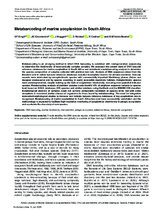Metabarcoding of marine zooplankton in South Africa
Abstract
Metabarcoding is an emerging method in which DNA barcoding is combined with next-generation sequencing to determine the biodiversity of taxonomically complex samples. We assessed the current state of DNA barcode reference databases for marine zooplankton in South Africa and undertook a metabarcoding analysis to determine the species composition of samples collected with plankton tow nets. Analysis of DNA sequences mined from the literature and in online barcode reference databases revealed incomplete records for all taxa examined. Barcode records were dominated by meroplanktonic species with commercially important life-history phases (fishes and decapod crustaceans) and by species occurring in easily accessible nearshore habitats. Holoplanktonic species were underrepresented, despite making up the bulk of zooplankton biodiversity, including most potential indicator species. Metabarcoding analysis of plankton samples could identify 45% of amplicon sequence variants to species level based on BOLD databases (123 species) and similar numbers using GenBank and the MIDORI COI classifier. Morphological analysis of samples could not achieve comparable resolution at species level, but with some exceptions it recovered similar classes of organisms to those found by metabarcoding. The need for integrative molecular/morphological studies to increase and validate barcode reference databases of key zooplankton taxa is recognised. Metabarcoding of marine zooplankton in South Africa has now been successfully undertaken and the methodology is expected to facilitate high-resolution monitoring of zooplankton biodiversity in pelagic ecosystems and accelerate the discovery of new species.

